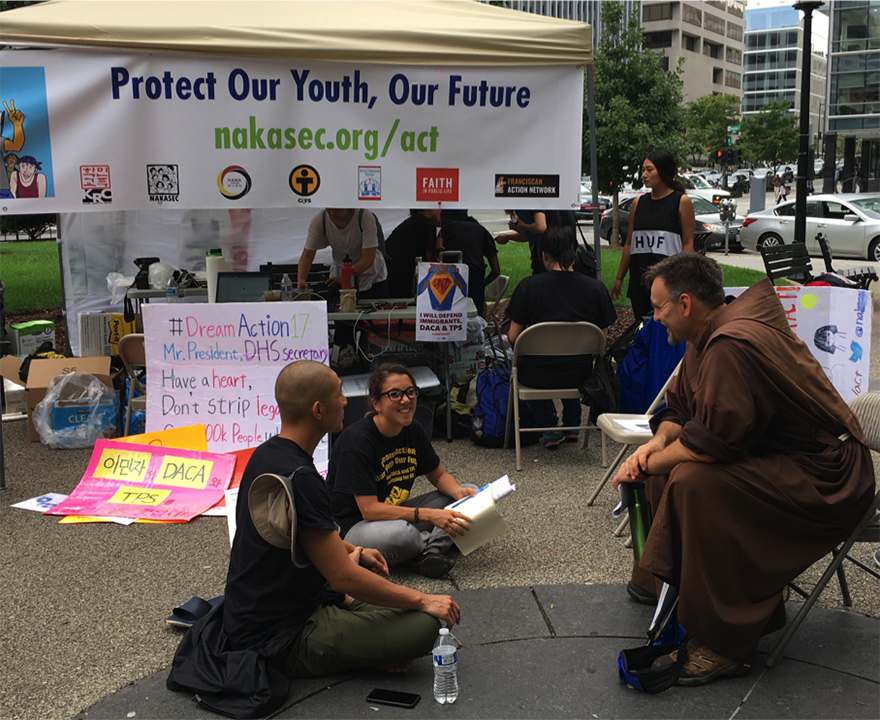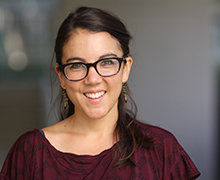Activist anthropologist

Activist anthropologist
- October 4, 2018
- UCI graduate student Elizabeth Clark Rubio widens the picture of undocumented immigrants
-----
 From viral photos of a child stopped at the border to presidential proclamations about
building a wall, when Americans debate the fate of undocumented immigrants, the conversation
tends to revolve around Latin Americans. Elizabeth Clark Rubio aims to widen that
picture, through both her research and activism.
From viral photos of a child stopped at the border to presidential proclamations about
building a wall, when Americans debate the fate of undocumented immigrants, the conversation
tends to revolve around Latin Americans. Elizabeth Clark Rubio aims to widen that
picture, through both her research and activism.
“While immigrants of Central America and Mexican origin certainly constitute the largest proportion of undocumented immigrants, public discourse often obscures the growing presence of both Asian and Black undocumented migrants,” says Clark Rubio, a graduate student in anthropology at UCI’s School of Social Sciences.
“In reality, Asians are the fastest growing undocumented population in the U.S.,” she says. Nearly one in every six undocumented immigrants living in the U.S. is Asian -- roughly 1.7 million individuals. “So we have to ask, what does it mean to have all these undocumented Asian Americans who no one wants to talk about?”
Recently, Clark Rubio won a $21,000 Ruth Landes Memorial Grant for work that she hopes will help expand the conversation about undocumented immigrants, and shed light on the Korean American immigrant experience, in particular. This funding is on top of research grants she received from the Center for Citizen Peacebuilding and the prestigious Wenner Gren Foundation.
“Immigrants are under attack more than ever before,” says Clark Rubio. “And undocumented status is often racialized in a way that makes a big difference, but that is rarely addressed openly.”
Taking action
Clark Rubio embodies the very diversity that she studies, in all of its rich complexity. A second-generation mixed-race Korean American who grew up in New York, Clark Rubio is fluent in both Korean and Spanish, and she lived and studied in Argentina for three years. And yet, because of her appearance, she sometimes experiences the benefits from white privilege. “Even though I am the daughter of a first-generation Korean immigrant, when I move through the world, I am often read as white,” she explains. “This means that I must constantly be checking myself in my research and everyday life -- what opportunities am I taking for granted, what assumptions am I making in my research because I partially benefit from white privilege?"
While earning her master’s at Georgetown University, and even after, Clark Rubio collaborated with the influential advocacy group CASA in Maryland. She worked closely with undocumented women who had been the victims of domestic abuse and human trafficking, helping them through the complicated and sometimes humiliating process of applying for special visas. At CASA, she started a program called “Yo Decido” which provided social support and a network of resources to the women. “While the visa certainly provides opportunities and indispensable forms of relief, it cannot alone heal the years of trauma and abuse that survivors experienced",” she explains.
When she arrived at UCI, Clark Rubio quickly began working to raise awareness among faculty, staff and students that undocumented students on campus come from diverse racial backgrounds.
“Leading up to the elections of 2016, and the aftermath, there was a lot of concern on campus about Dreamers,” explains Eleana Kim, associate professor of anthropology. “A large portion of the undocumented students at UCI are actually from Asian countries, so if a faculty member assumes a Dreamer looks a certain way, they might not take into consideration what an undocumented Asian student might actually be going through.”
Clark Rubio organized workshops for undocumented students who were experiencing stress because of the political debate about their futures, but also for those who felt invisible within that debate.
For this work, Kim and several faculty nominated Clark Rubio for the national 2018 Thomas I. Yamashita Prize for activist academics. That Clark Rubio won an honorable mention for the prize is significant, as honorees are typically much farther along in their academic careers.
“It really speaks to the fact that Liz is not only doing course work, getting ready for her fieldwork, and working as a research assistant,” says Kim. “She’s also been doing these extremely important activities that at this moment in time, under this presidency, are just so essential.”
Complicating narratives
Those advocacy experiences at UCI helped inform Clark Rubio’s research, which explores how grassroots Korean American groups have emerged in the national immigrant rights movement, and how they engage with larger, more established Latino-serving organizations.
Clark Rubio points out that the “model minority” stereotype complicates Asian Americans’ relationships with other immigrant groups. It can be hard to forge good relationships when society treats one ethnic group like the favorite sibling.
“The cultural stories and stereotypes that facilitate attacks on immigrants today are much longer standing than we might like to admit,” says Clark Rubio. “We’ve had this narrative of the model Asian immigrant and the exceptional Asian since the 1960s when term ‘model minority’ first arose.”
Current estimates show 33,000 undocumented Korean Americans living in Southern California and 22,000 in New York City -- the two locations Clark Rubio has chosen for her field work. Through her research, she works with both the Korean American activists as well as the traditionally Latino-serving organizations on both coasts to better understand their similarities, differences, and complex relationships.
Clark Rubio’s work explores nuances that may be completely missing from the political debates, but that doesn’t make it any less vital. “Especially because so many of us feel overwhelmed and despairing in today’s political climate,” says Kim, “we need people like Liz who can keep doing the hard work of activism and raising awareness.”
-Christine Byrd for the UCI School of Social Sciences
-pictured: Anthropology graduate student Elizabeth Clark Rubio conducts fieldwork
with advocates and activists for undocumented immigrants.
-----
Would you like to get more involved with the social sciences? Email us at communications@socsci.uci.edu to connect.
Share on:
Related News Items
- Careet RightSocial sciences research at risk
- Careet RightI Dig UCI
- Careet RightWhy should you keep a lucky frog in your home, according to feng shui
- Careet RightAttending the National Conference for Black Political Scientists
- Careet RightHerzfeld joins UCI anthropology as Distinguished Visitor in residence for winter quarter


